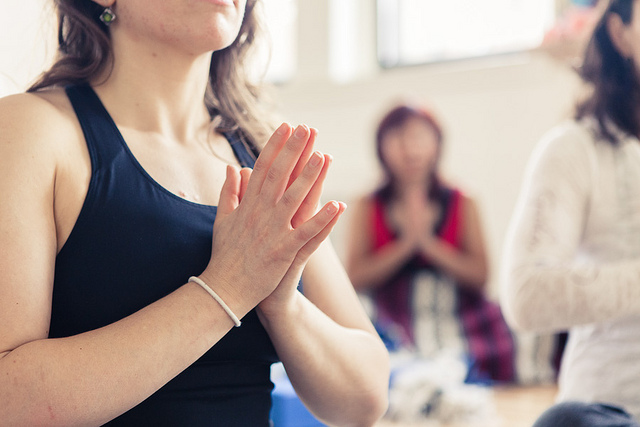As a yoga teacher and trainer of teachers, nothing gets me more fired up than than a poorly taught asana class.
The U.S. is saturated with teachers and yet there are so few classes where I can completely turn off my teacher brain.
What is “teacher brain,” you ask?
Well, it’s the part of every yoga teacher’s mind that notices when another teacher says or does something awesome or funky. It can feel like a burden at times because when I go to a class, I want to strictly be a student, but sometimes my teacher brain is so busy taking notes that my student brain leaves the building entirely.
Some may argue that failing to focus my attention entirely on myself exhibits a lack of disciple on my part. But when a teacher is dishing out dangerous alignment instructions, speaking incorrectly about anatomy or truly missing the mark on philosophical themes, the whole class is at risk. Teacher brain kicking into overdrive is largely about observing the way yoga teachers everywhere are representing a profession that I love and respect deeply.
I’ve been to classes where I’ve been ignored, aggressively adjusted, talked down to, denied modifications, lead through illogical sequencing, berated for hydrating in extreme heat, only given a two-minute Savasana or no Savasana at all! The list goes on and on.
Maybe some of this would be excusable if yoga weren’t so expensive. I feel strongly that the quality of teaching should be impeccable if we’re going to spend $15-$30 on a 60-90 minute public class.
So what can be done about the world’s massive amount of uneducated yoga teachers?
One possible solution might be to change the structure of training entirely. Perhaps it could be of benefit for yoga teachers to participate in a training similar to a college curriculum. For example, instead of a 200-hour training, aspiring teachers would enter into a four-year program. After graduation, if they wanted to explore specialty topics, they would complete additional years, much like a doctor.
This kind of commitment might seem excessive to some, but I am very intrigued by the idea. These days, anyone can say they’re a yoga teacher. Plenty of gyms, wellness centers and studios will allow people to teach with minimal to no training. The Yoga Alliance is trying to create some standards and expectations for what a teacher should know before students are under their care, but at this point, it’s a very hard thing to regulate.
Adapting a college structure would inevitably decrease the quantity of teachers and increase quality. Wouldn’t that be better for everybody? Or would some of our most influential teachers never have the opportunity to teach because a college structure would either be unavailable or unappealing to them?
Another more realistic and immediate solution lies in potential teachers being more discerning when it comes to choosing a 200-hour training. There are a few exceptional 200-hour trainings out there that are doing an exemplary job of thoroughly preparing their trainees to be great teachers. These are the kinds of trainings that require a high level of discipline and commitment on the part of the trainees. If trainees put in the work with a strong and capable faculty, they will likely come through the experience ready to teach a solid class.
Finding these schools aren’t easy. If you’re searching for a place to get certified, don’t hesitate to call the school’s director and ask these five essential questions.
For those of us that are already basically trained and out there in the world teaching, change starts with the individual. If every teacher were willing to honestly look at what they’re offering and explore the areas in which they could improve, that would be a phenomenal start.
The next step is to go out and be a student, learning as much as we can from as many people as we can.
When we are ready to share new insights with our students, asking trusted peers and mentors to attend our class and give us feedback can be hugely beneficial to our growth.
Though, in the end, how do we even measure if a yoga teacher is above or below average?
I know my favorite teacher is despised by many and she meets all of my “above average” criteria. If we preach non-judgement and the absence of labels in yoga rooms, how can we say a teacher is good or bad? Isn’t that just like, our opinion? How much is it worth examining on a grand scale? Some may say “to each his own” and not give it another thought.
However, I do believe we have a responsibility as teachers to ensure that the yoga we’re passing down to our students is safe, accurate and authentic. I envision a world where I can frequently turn off my teacher brain and simply enjoy the pleasures of being a student.
Love elephant and want to go steady?
Sign up for our (curated) daily and weekly newsletters!
Author: Megan Ridge Morris
Editor: Renée Picard
Photo: elidr/Flickr









Read 15 comments and reply